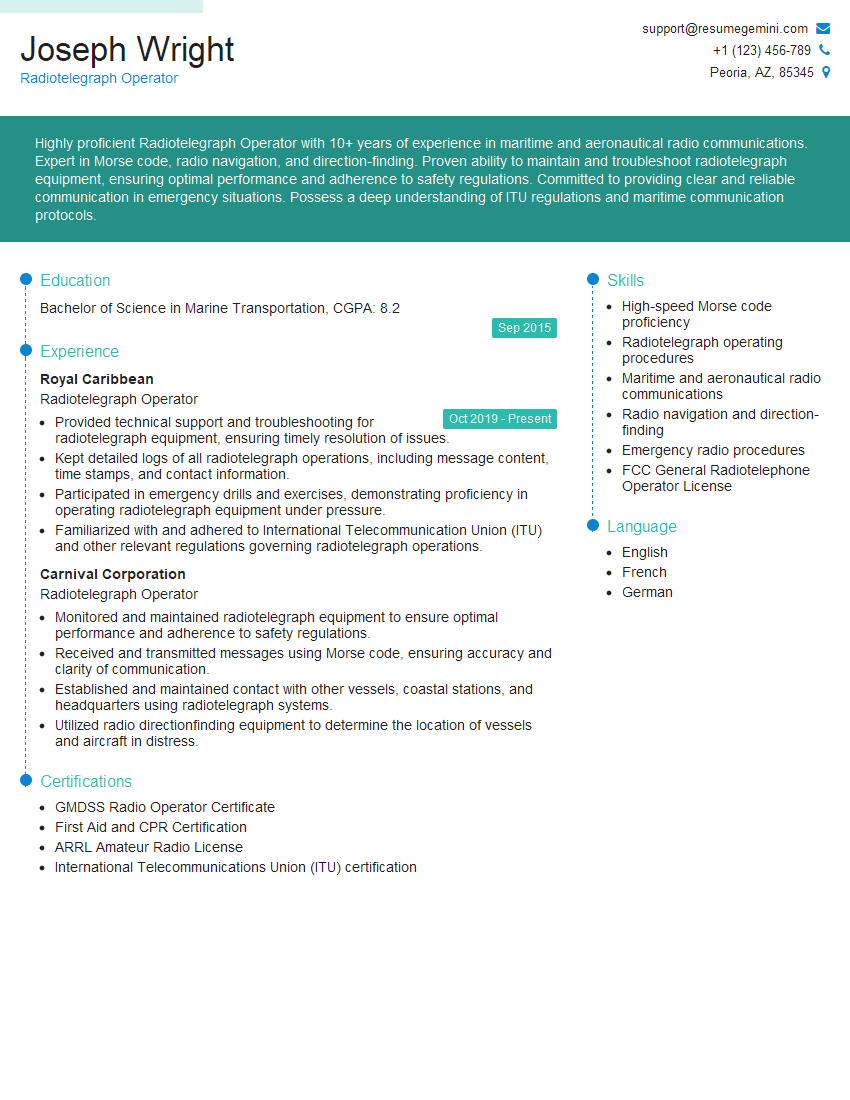Are you a seasoned Radiotelegraph Operator seeking a new career path? Discover our professionally built Radiotelegraph Operator Resume Template. This time-saving tool provides a solid foundation for your job search. Simply click “Edit Resume” to customize it with your unique experiences and achievements. Customize fonts and colors to match your personal style and increase your chances of landing your dream job. Explore more Resume Templates for additional options.

Joseph Wright
Radiotelegraph Operator
Summary
Highly proficient Radiotelegraph Operator with 10+ years of experience in maritime and aeronautical radio communications. Expert in Morse code, radio navigation, and direction-finding. Proven ability to maintain and troubleshoot radiotelegraph equipment, ensuring optimal performance and adherence to safety regulations. Committed to providing clear and reliable communication in emergency situations. Possess a deep understanding of ITU regulations and maritime communication protocols.
Education
Bachelor of Science in Marine Transportation
September 2015
Skills
- High-speed Morse code proficiency
- Radiotelegraph operating procedures
- Maritime and aeronautical radio communications
- Radio navigation and direction-finding
- Emergency radio procedures
- FCC General Radiotelephone Operator License
Work Experience
Radiotelegraph Operator
- Provided technical support and troubleshooting for radiotelegraph equipment, ensuring timely resolution of issues.
- Kept detailed logs of all radiotelegraph operations, including message content, time stamps, and contact information.
- Participated in emergency drills and exercises, demonstrating proficiency in operating radiotelegraph equipment under pressure.
- Familiarized with and adhered to International Telecommunication Union (ITU) and other relevant regulations governing radiotelegraph operations.
Radiotelegraph Operator
- Monitored and maintained radiotelegraph equipment to ensure optimal performance and adherence to safety regulations.
- Received and transmitted messages using Morse code, ensuring accuracy and clarity of communication.
- Established and maintained contact with other vessels, coastal stations, and headquarters using radiotelegraph systems.
- Utilized radio directionfinding equipment to determine the location of vessels and aircraft in distress.
Certificates
- GMDSS Radio Operator Certificate
- First Aid and CPR Certification
- ARRL Amateur Radio License
- International Telecommunications Union (ITU) certification
Languages
- English
- French
- German
Career Expert Tips:
- Select the ideal resume template to showcase your professional experience effectively.
- Master the art of resume writing to highlight your unique qualifications and achievements.
- Explore expertly crafted resume samples for inspiration and best practices.
- Build your best resume for free this new year with ResumeGemini. Enjoy exclusive discounts on ATS optimized resume templates.
How To Write Resume For Radiotelegraph Operator
- Emphasize your Morse code proficiency and speed.
- Highlight your experience in maritime and aeronautical radio communication.
- Quantify your accomplishments with specific examples.
- Obtain relevant certifications (e.g., FCC General Radiotelephone Operator License).
- Continuously update your knowledge and skills.
Essential Experience Highlights for a Strong Radiotelegraph Operator Resume
- Monitored and maintained radiotelegraph equipment, ensuring optimal performance and adherence to safety regulations.
- Received and transmitted messages using Morse code, ensuring accuracy and clarity of communication.
- Established and maintained contact with other vessels, coastal stations, and headquarters using radiotelegraph systems.
- Utilized radio directionfinding equipment to determine the location of vessels and aircraft in distress.
- Provided technical support and troubleshooting for radiotelegraph equipment, ensuring timely resolution of issues.
- Kept detailed logs of all radiotelegraph operations, including message content, time stamps, and contact information.
- Participated in emergency drills and exercises, demonstrating proficiency in operating radiotelegraph equipment under pressure.
- Familiarized with and adhered to International Telecommunication Union (ITU) and other relevant regulations governing radiotelegraph operations.
Frequently Asked Questions (FAQ’s) For Radiotelegraph Operator
What is the role of a Radiotelegraph Operator?
A Radiotelegraph Operator is responsible for operating and maintaining radiotelegraph equipment for sending and receiving messages via Morse code. They play a vital role in maritime and aeronautical communication, ensuring the safety and efficiency of operations.
What skills are required for a Radiotelegraph Operator?
Radiotelegraph Operators need proficiency in Morse code, knowledge of radio operations, navigation and direction-finding techniques, as well as FCC licensing and understanding of relevant regulations.
What is the work environment of a Radiotelegraph Operator?
Radiotelegraph Operators typically work in a ship’s radio room or a communication center. They spend extended periods monitoring and operating radio equipment, and may also be required to work during emergencies.
What is the career outlook for Radiotelegraph Operators?
The demand for Radiotelegraph Operators has declined due to technological advancements, but qualified individuals may find opportunities in maritime, aviation, and government agencies.
What are the opportunities for career advancement for Radiotelegraph Operators?
With experience and additional training, Radiotelegraph Operators can advance to supervisory roles or specialize in areas such as marine electronics or radio navigation.
What is the salary range for Radiotelegraph Operators?
The salary range for Radiotelegraph Operators can vary depending on experience, location, and industry. According to Salary.com, the average salary for Radiotelegraph Operators is around $60,000 annually.
What is the job market for Radiotelegraph Operators?
The job market for Radiotelegraph Operators is competitive, but experienced and certified individuals may find opportunities in various industries.
What kind of training is required to become a Radiotelegraph Operator?
To become a Radiotelegraph Operator, you typically need formal training in radiotelegraph operation and Morse code proficiency. This training can be obtained through maritime academies, colleges, or specialized training programs.